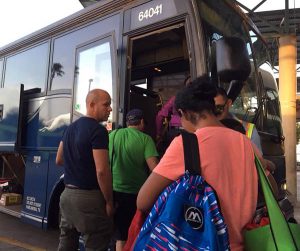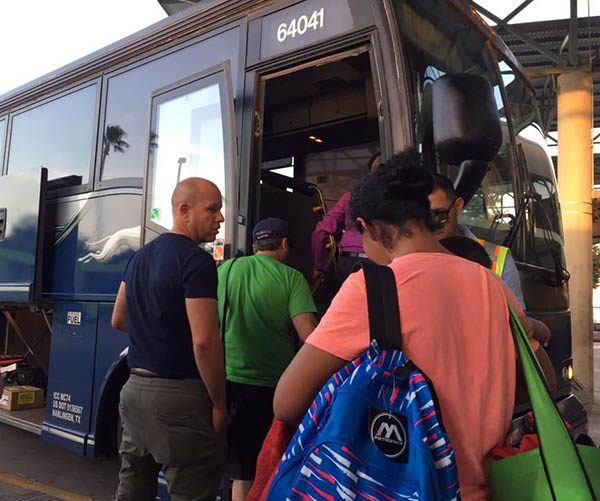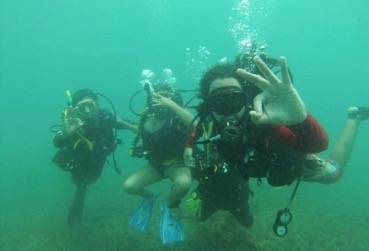By Kathy Bougher
Kathy Bougher is a journalist, correspondent for ESCRIBANA, feminist activist, and educator who has traveled throughout Central America working with women’s groups in the region on reproductive rights and other social justice issues. She spent several days on the US-Mexico border talking to immigrants caught in limbo in this current crisis, and volunteering at various migrant shelters.
We are publishing her observations here on ESCRIBANA, organized by date.
July 24, 2018
McAllen, Texas.
I’ve been on the border in McAllen, Texas since last week following two weeks of visiting a few of the migrant shelters in southern Mexico and in Guatemala. Here in McAllen I’ve spent several hours each day volunteering at the Migrant Respite Center run by Catholic Charities. It opened in 2014 in response to the huge numbers of unaccompanied minors but also women with children, mostly Central Americans crossing the border.

Immigrant families and others boarding the bus in McAllen, TX (Photo by Kathy Bougher)
I’ve been here to McAllen four times before, and it’s always been a very intense place, but it feels even more so this time. All the migrants/asylum seekers who pass through the center are mothers or a few fathers who have crossed the border with their children, either turned themselves in or were caught by Border Patrol, were detained in McAllen Detention Center, passed the initial credible fear interview, and were released to travel by bus to the home of a relative somewhere in the U.S. who agreed to sponsor them and pay their bus fare. From there they will deal with their asylum cases and deportation orders. All the adults (except pregnant women and maybe nursing women) have electronic ankle bracelets. They usually have to cut off their pant legs to be able to change clothes.
Immigration drops off somewhere around 75 to 300 people per day at the center. There people are offered food, clean clothing, toiletries, a shower, phone calls, a chance to rest, medical treatment, children’s play area, and mostly a chance to restore a sense of dignity.
I’ve done mostly shower duty the last few days, so I’ve talked to lots of women, adolescents and little children who’ve just had their first shower and clean clothes and chance to brush teeth for the first time in somewhere around three to eight days. They emerge from showers with clean clothes and shiny wet hair and much more relaxed faces and smiles,
As they comb out knots from long thick hair for the first time in days, and braid their children’s hair, some women talk about their experiences, and I listen. Once someone starts the conversation, the horrendous details of their experiences in the McAllen detention center came gushing out.
The number of days they spent locked up in detention ranged from 24 hours for a woman who was eight months pregnant– and thereby given “special consideration” –to three to eight days.
These families are not part of the massive family separation policy, as far as I can tell. However, some of the families were separated for the days they were incarcerated. It sounds like because of the news about family separation, many people were really scared about whether this was indeed a short-term separation or not. Short or long, it still traumatized children and parents.
Some of what I have heard anecdotally from women:
- As in many other detention centers, they call it “la hielera” for the ice box temperatures.• Not enough food. Cold, still partially- frozen sandwiches with meat in colors they have never seen nor eaten before. There is punishment for not eating the food, even when the children are vomiting it up as quickly as they try to swallow it. Not enough water.

Central Processing Center in McAllen, Texas – AFP Photo/US Customs and Border Protection/handout

McAllen Central Processing Center is located in an old Walmart building. Photo by Kathy Bougher
- Sleeping on floors, a few on mats, with space blankets.
- A “count” is taken periodically by guards, including several times during the night. The lights are on all the time, so it’s hard to sleep and hard to get kids to go to sleep. Then guards awaken everyone, sometimes by kicking them, so they get up for the count. The children have to be awakened, too.
- Guards telling kids and parents that the kids have to sit still and stay quiet. (It sounds like some kids are separated and some are with parents.
- Kids who cried were told by guards they wouldn’t see their parents again or they would be deported.
- Most people had no showers the whole time they were there. A few had showers on the fourth or fifth day.
- No access to clean clothes. One woman said her child vomited on her twice, but she no way to clean herself up, nor her child.
- No way to brush teeth or brush hair.
- One woman said the guard angrily told her that immigrants were taking jobs that let people in the U.S. feed their kids. This feisty woman told the guard she just wanted to work to feed her own kids. The guard said she would be punished for “talking back,” and she was returned to “la hielera,” from which she had been moved earlier to another area.
- Several women told about a pregnant woman who gave birth, not the woman who received “special consideration.”. It was wasn’t clear if the woman was taken to a hospital before or after she gave birth, but then she was returned to the detention center with her baby and placed in “la hielera” again. I talked to a doctor who was volunteering at the center, and she said she’d ask some questions to try to see what was going on.
- As far as the proportion of people at the detention center who get through the credible fear interview and get to the Respite Center, rather than being deported, it sounds like the proportion is small. The women described “many,” “thousands,” “huge numbers” of migrants in the detention center, and that only a small proportion get approved to go with their families.
I’ve also met some amazing Texas activists here, too. People often arrive at the bus station with supplies—water, snacks, coloring books, blankets– for the people ready to board buses for trip ranging from 4 hours to three or four days. I met a group of educators and a group that call themselves “Angry Tias y Abuelas.” (Angry aunts and grandmothers). They prepare backpacks with supplies for families. From the Tias and Abuelas I learned that immigration also drops off women and children at the Brownsville bus station, too, with absolutely nothing.
So there are good people doing great things to ameliorate a situation that should never exist to begin with. The real fight is to change the laws, policies, and practices that allow this to take place.




